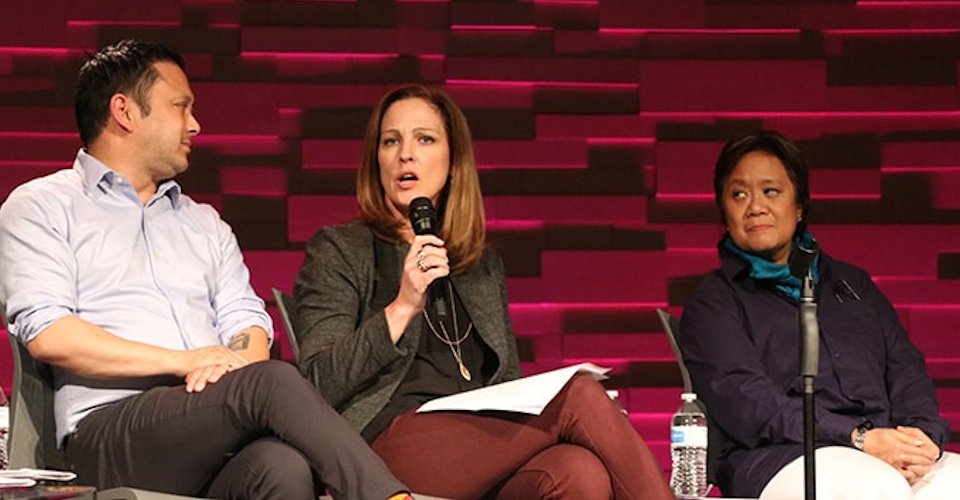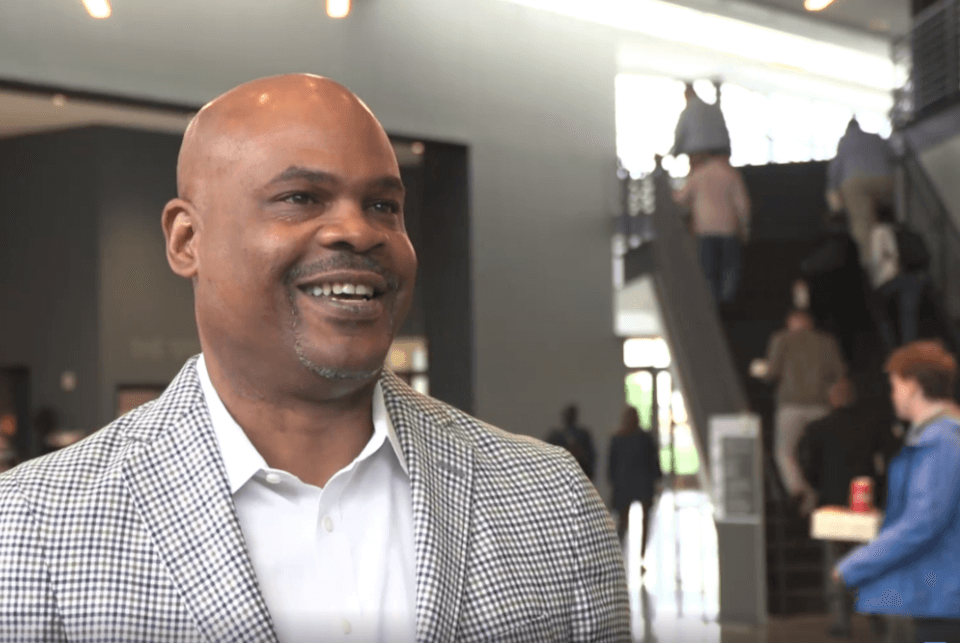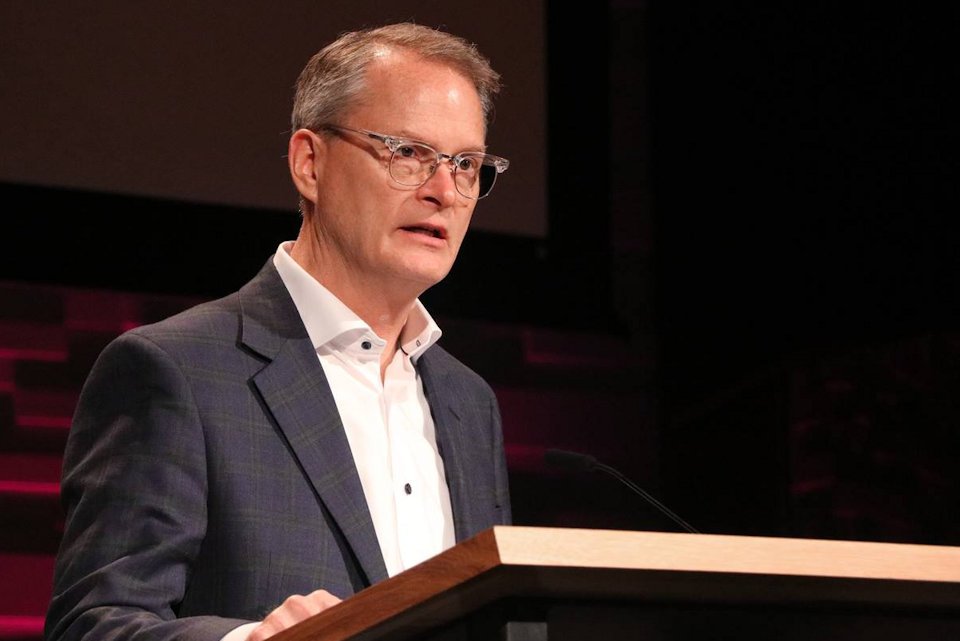Twelve United Methodists from Michigan participated in the UMCNext gathering in Kansas City, exploring possible new directions for The United Methodist Church.
HEATHER HAHN
UM News
More than 600 U.S. United Methodists spent three days grappling with possible options for forging what they hope will be a more just and inclusive church future.
What united those at UMCNext, which met May 20-22 behind closed doors, was their opposition to the Traditional Plan.
That legislation, which the special 2019 General Conference approved by a vote of 438-384, retains the church stance that the practice of homosexuality is “incompatible with Christian teaching” and strengthens enforcement of church bans on same-sex weddings and “self-avowed practicing” gay clergy.
The increased enforcement takes effect January 1, 2020 in the United States. But another General Conference, the denomination’s top lawmaking assembly, is also just around the corner, next May.
“We gathered here because the decision that happened at the special General Conference is not acceptable,” said Karen G. Prudente of the New York Conference in a press conference after the event. She is on the event’s 17-member convening team. “We came here to discern a better way forward for The United Methodist Church.”
Those gathered identified two possible approaches toward a new Methodism, said the Rev. DJ del Rosario of the Pacific Northwest Conference. These include continued resistance to the Traditional Plan with the goal of reforming the church from within, as well as some form of negotiated separation to create something new.
Those gathered did not reach a consensus on a single direction. For now, those in attendance are working on a both-and-approach. And working groups will be developing plans for the next General Conference to consider.
“There are churches who feel every urgency that they are going to leave now,” said the Rev. Adam Hamilton, one of the event’s conveners. “There are also churches that say we couldn’t leave even if we wanted to… So we’re ultimately going to have several pathways forward.”
Hamilton is the lead pastor of United Methodist Church of the Resurrection, the event host and the denomination’s most-attended U.S. church with nearly 7,000 in worship on average each week.
He and others at the press conference were also clear that resistance could mean violating the restrictions in the Book of Discipline, the denomination’s policy book, and risking their ministry. Resistance, conveners said, also could take less dramatic forms such as making sure their communities know all are welcome.
“The term resistance is grounded in our baptismal vows,” said the Rev. Junius Dotson, an event convener and the top executive of Discipleship Ministries. “We promise to resist evil, injustice and oppression in whatever forms they present themselves. So there are many forms of resistance, and people have to decide how they will participate.”
The UMCNext gathering drew together at least 10 representatives from each of the denomination’s 54 U.S. conferences — many of whom applied to go. Hamilton said the event had 2,000 more people apply to attend than could fit in the room.
Event organizers, he said, worked to ensure inclusion of LGBTQ United Methodists, diverse ethnic/racial groups and young people. Also in attendance were 16 bishops, among them Bishop David Bard of The Michigan Area.
Ahead of the gathering, Hamilton said that it was closed to the press because of concern “that the dialogue might be less frank, open and honest” otherwise.
But during the event, a number of participants as well as event critics took to Twitter and Facebook to air their thoughts and complaints — offering only snippets about what was happening.

The Rev. Ginger Gaines-Cirelli, senior pastor of Foundry United Methodist Church in Washington, said during the press conference that those gathered agreed to four commitments.
These include:
- To be passionate followers of Jesus Christ, committed to a Wesleyan vision of Christianity.
- To resist evil, injustice and oppression in all forms and toward all people and build a church which affirms the full participation of all ages, nations, races, classes, cultures, gender identities, sexual orientations and abilities.
- To reject the Traditional Plan approved at General Conference 2019 as inconsistent with the gospel of Jesus Christ and resist its implementation.
- To work to eliminate discriminatory language and the restrictions and penalties in the Book of Discipline regarding LGBTQ individuals.
Table discussions, Gaines-Cirelli said, centered on people’s hopes for the church.
And indeed multiple participants at the event’s conclusion expressed hope for the church’s future.
Bishop David Bard said, “These past couple of days have been a time of rich conversation – deep, meaningful, sometimes difficult, sometimes challenging, sometimes painful. We heard stories of some of the pain and hurt experienced by LGBTQ persons in the church. Such rich and deep conversations are not possible at General Conference.” Bard left the meeting hopeful that something new and positive can emerge within the Methodist tradition. “The shape of this new Methodism is yet to be determined,” he said, “but there is a determination to continue conversations and enter into negotiations with others. The current situation in the church is untenable, but something new and creative is emerging.” Bard acknowledged that the event was a beginning. “My hope is combined with a realistic sense that hard work remains to be done.”
“It is encouraging to see centrists and progressives looking at some way forward for the United Methodist movement that looks a whole lot different than what we saw at General Conference,” said the Rev. Clayton Oliphint, senior pastor of First United Methodist Church in Richardson, Texas.
“I think this is a wilderness time for us,” he said. “But I think God is leading us to something better.”
A group of interested United Methodists from Michigan were involved in UMCNext. They do not represent The Michigan Conference, but volunteered to participate in the event, at their own expense. They are: Kennetha Bigham-Tsai, Bridget Cabrera, Melanie Carey, Elbert Dulworth, Paul Perez, Nichea VerVeer Guy, Alex Plum, Tom Russell, Kevin Smalls, Megan Walther and Laura Witkowski. At the close of the gathering, they created the following statement:
We are Michigan United Methodists who will work towards a fully inclusive church which includes addressing systemic racism, sexism, classism, colonialism, ageism, negative perceptions of abilities and trans and homophobia. We are faithful, hopeful, strategic leaders working together to cast vision and form next steps and we invite you to join with us in this work. We are not in a wait and see posture, and we will not let our fears paralyze us. We are more convinced than ever that we need to keep doing the work of dreaming for a new fully inclusive future as the people called Methodists in Michigan. We trust Jesus is leading us forward.
The Rev. Melanie L. Carey, Nardin Park UMC in Farmington, is among those pledged to a truly inclusive churche, “where each person has a seat at Christ’s table.” She hopes “people back home will stay encouraged as there is much work is to come.” Grateful for participation in UMCNext, Carey noted, “It feels like a resurrection is happening in the church.”
The Rev. Elbert Dulworth, Senior Pastor of Birmingham: First UMC, added, “This gathering brought together bold and courageous United Methodist leaders from across the U.S. who are committed to ending the harm done by the passing of the Traditional Plan. I am convinced that the Spirit of God is moving as we work for and live into a new expression of the Church together in Jesus Christ.”
Nichea VerVeer Guy, who participated in the 2019 General Conference as a co-chair of the Michigan delegation, experienced healing at the gathering in Kansas City. “I have to say my soul has been fed and the feelings coming out of this gathering are so much different than St. Louis.” She praised the healthy discernment process at UMCNext. “Working through the what ifs and maybes got us to the it could! Learning to express our visions in constructive ways allowed for a new kind of hope,” she concluded.
“The General Conference is broken,” Guy said, “I feel prepared to start this journey.”
The UMCNext event came on the heels of another gathering where the church’s future was on the agenda. The Our Movement Forward summit, on May 17-18 at Lake Harriet United Methodist Church, also brought together United Methodists who advocate for full inclusion of LGBTQ Christians.
The summit, which was open to any who wanted to attend, aimed to center on the liberation of the marginalized, namely people of color and queer and transgender individuals. The event also had similar options on the table, including both resistance and the formation of a whole new expression of Methodism.
The Rev. Heecheon Jeon, a district superintendent in the Iowa Conference, attended both gatherings. He sees opportunities for sharing ideas across both gatherings. He said Iowa United Methodists who attended either event plan to get together to discuss next steps for moving forward.
“I hope we can share some common values to widen the circle of this liberation movement,” he said.
Alex Plum, in Kansas City from Michigan, was also present at both gatherings. Plum said, “There is not going to be a one-size-fits-all path for centrists and progressives to build a new Methodism.” He urged his home conference to, “simply step forward and offer a vision of what the beloved community looks like, to show what radical inclusion of folks on the margins looks like.”
The Rev. Paul Perez, Associate Director of Mission and Ministry for The Michigan Conference, expressed similar hope from his experience at UMCNext. “I learned that the situations facing anual conferences around the U.S. are very different,” Perez remarked. “Each region must continue to prayerfully discern, decide, and implement strategies right for their context. I hope here in Michigan we might embrace this moment of immense possibilities — and lead in the creation of new liberative and missional forms of Methodism.”

The Rev. Tyler Sit, the openly gay founding pastor of New City Church in Minneapolis, was a co-convener of Our Movement Forward and a participant at UMCNext.
He likened what’s happened at the 2019 special General Conference to a giant, old tree that has fallen in a forest, leading to new saplings starting to grow and reach for the light.
“I think it would be an improper move to try to commandeer or consolidate efforts too soon,” he said. “We are at a place right now where we need a breadth of efforts because we don’t know what’s going to work.”
The Rev Kevin Smalls, Senior Pastor of Southfield: Hope United Methodist Church, had a word for those who expected a more definitive path to issue from UMCNext. “It wasn’t the intent of the conveners for us to leave with a plan, but at minimum to begin the conversation or join in on conversations emerging from various theological camps.” Smalls cautioned, “My concern, my deep concern is that there not be any marginalized communities left out in this conversation.”
Nevertheless, Smalls left energized, “considering the creation of a new expression of faith, especially since we serve a God who has promised to make all things new.”
~ Kay DeMoss, Content Editor Michigan Conference, added information from The Michigan Conference participants to this account.
Last Updated on September 20, 2022

